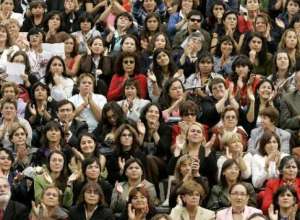 Well, the International Women’s Day was recently celebrated amid some press and fanfare and I sat there remembering the first ever Women’s Day declared in the U.S. in the 70’s — what the world was like then for women, how we felt and what’s come out of those fervent days..
Well, the International Women’s Day was recently celebrated amid some press and fanfare and I sat there remembering the first ever Women’s Day declared in the U.S. in the 70’s — what the world was like then for women, how we felt and what’s come out of those fervent days..
There I was, in Boston, being the first woman to host her own talk show without the help of a male host, tackling the tough subjects of the day, and there were many —the women’s movement, the Vietnam War, Nixon and Watergate, the new consciousness-raising movements for both men and women. The Sonya Hamlin Show presented the first-ever birth of a child with natural childbirth on TV. We tackled the issues of homosexuality with gay men and women who dared, for the first time, to come forth and speak their names. We dealt with the school desegregation of Boston – a very bitter struggle – by my hosting members of the Ku Klux Klan and the White Citizen’s Council to show Boston whom they were really dealing with. I interviewed all the leaders of the new young women’s movement, promoted their books, even launched every aspect of Ms magazine for a week on our air before it ever came out for the public on newsstands. And my station, WBZ, supported us and didn’t lay a hand on our programming. Truly groundbreaking broadcasting.
And then came the announcement of the first ever U.S. Women’s Day.
It meant “Stand Up and Be Counted”. March down the streets of downtown, link arms, sing Helen Reddy’s “I am Woman, Hear me Roar”. It meant being open and visible to each other as a group — not just as individual letter-writers to the editor or phone campaigns or passing petitions around. What a feeling!
Our personal passions were suddenly multiplied and shared with so many others – we were live and visible. It was a little intimidating but so exhilarating. And so new… But then, as we marched, I saw and heard a bunch of hard-hat workers hanging out of an unfinished building, cracking the usual cracks, whistling the usual whistles, telling us to go home and get in the kitchen, in the bed etc. and I was reminded again of the uphill climb before us.
What’s sad to me today is that the newest generation of women have no idea what that fight was like. They never think about how come they now have so many opportunities that didn’t exist for us, the first wave of women trying to enter the big world as equal participants. They have no idea how it felt to be the first women into the various jobs that seems commonplace. We needed to fight so hard to even get heard or taken seriously, to even be allowed to apply for and enter the new possibilities we were making happen. I remember having experts on my show talking about new work modes to accommodate women, like flex-time and shared jobs and the four- day work week –all now quite commonplace. We were ridiculed, especially by the established workplace.
So as I read about plans for the newest International Women’s Day I reflected on how social change happens—how hard it is, how exposed the early proponents are—and how quickly that painful struggle gets absorbed into the mainstream and never even thought of—the changes simply becoming part of what’s expected.
Wouldn’t really knowing the history of the women’s movement strengthen today’s young women? Not just to surprise them but also to deepen their understanding of what issues they still face and inspire them that it’s possible to make social change. And to discover the joy of finding each other and join again in pursuing common goals.

